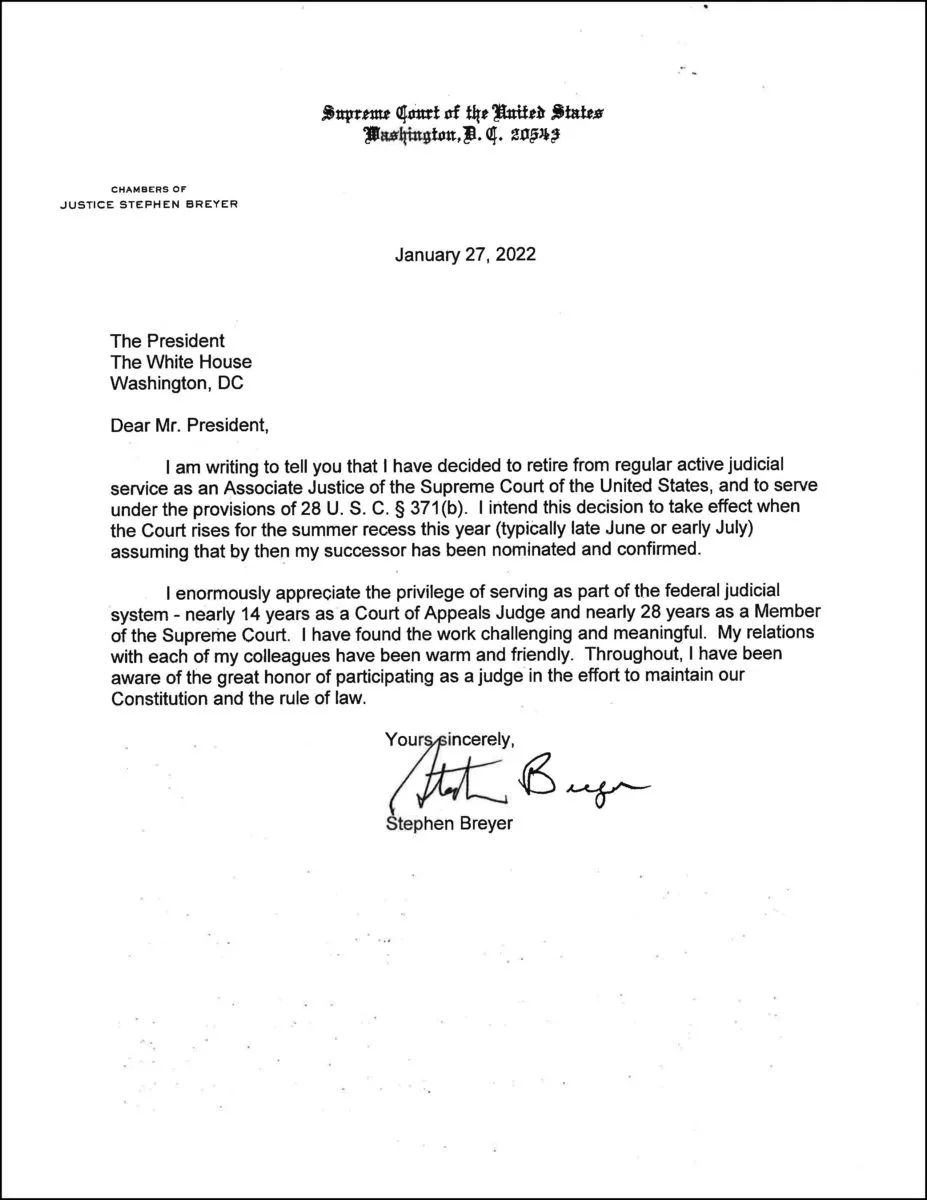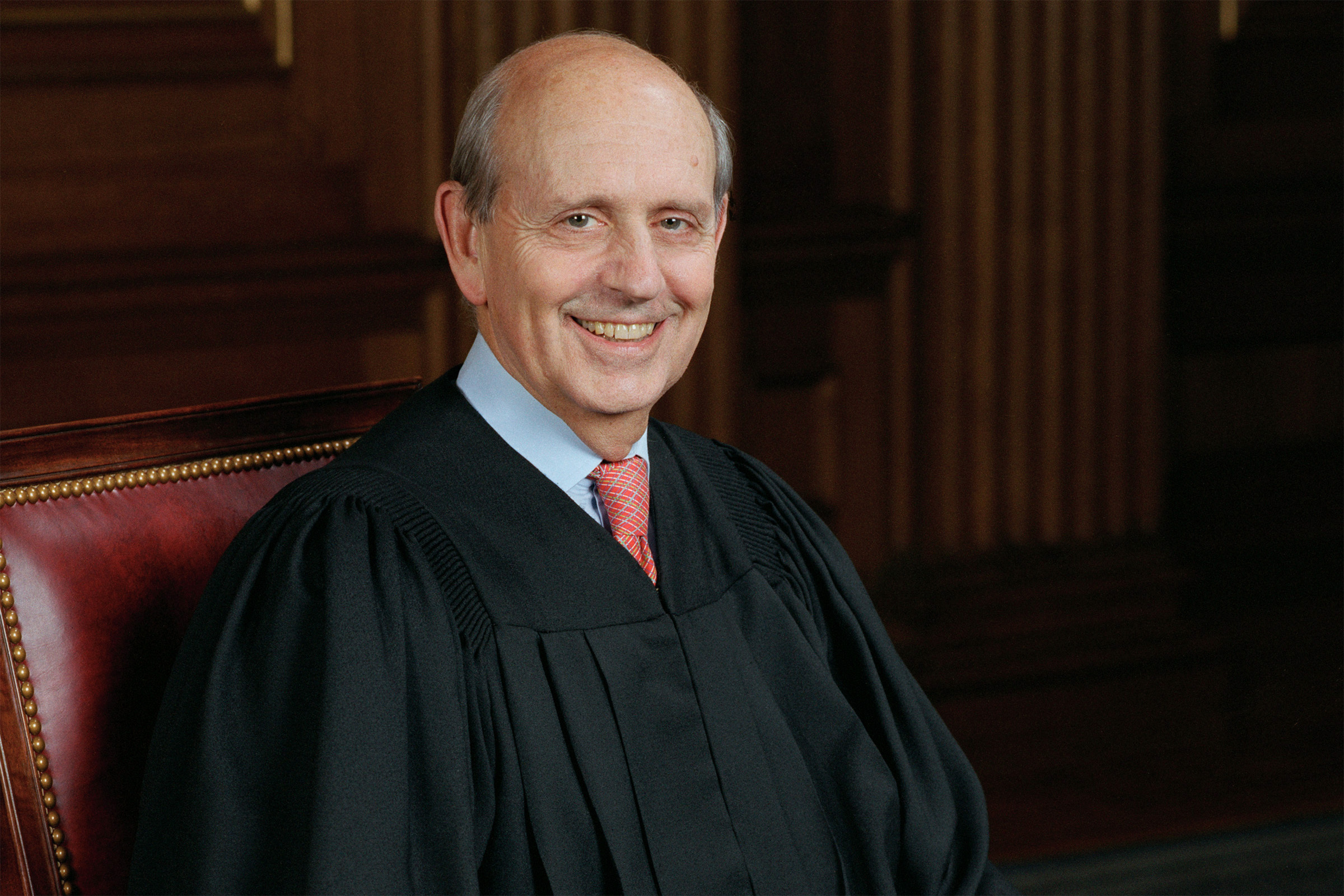Supreme Court Justice Stephen Breyer ’59 will retire after more than 27 years on the highest bench, according to a letter he sent to President Joe Biden Thursday morning. Breyer, who is currently the Court’s oldest justice, graduated from Stanford with a Bachelor of Arts in Philosophy in 1959. He was nominated to the Court by former President Bill Clinton in 1994.
Breyer’s retirement will take effect when the Supreme Court enters its summer recess, which is usually in late June or early July, “assuming that by then my successor has been nominated and confirmed,” Breyer wrote.
Breyer also wrote that he has found his work on the Court “challenging and meaningful” and has “been aware of the great honor of participating as a judge in the effort to maintain our Constitution and the rule of law.”

Breyer, a Bay Area native, began his Stanford career as a frosh living in Arroyo in Wilbur Hall. While at Wilbur Hall, he unsuccessfully ran to represent the dorm in the Associated Students of Stanford University.
As an undergraduate, he was involved with speech and debate and co-chaired a student organization dedicated to helping international students transition to Stanford. He went on to graduate with Phi Beta Kappa honors.
After Stanford, Breyer earned degrees from Oxford University and Harvard Law, each with the highest honors possible. Fresh out of law school, he clerked for then-Supreme Court Justice Arthur Goldberg. He later lectured at Harvard Law School and served as an Assistant Special Prosecutor of the Watergate Special Prosecution Force in 1973. Seven years later, then-President Jimmy Carter appointed Breyer to the First U.S. Circuit Court of Appeals, which he ultimately left to join the Supreme Court.
“Stephen Breyer has brought a uniquely empirical and pragmatic perspective to the Court,” wrote Director of the Stanford Constitutional Law Center and Senior Fellow at the Hoover Institution Michael McConnell in a statement to The Daily.
McConnell praised Breyer for his role as a “moderate liberal,” which he said helped Chief Justice John Roberts “forge a coherent center on the Court.”
With Breyer by his side, Biden lauded the retiring justice for his intellect, work ethic and legal insight during a Thursday morning White House press conference. Biden also spoke to Breyer’s character and drive to collaborate across the aisle, saying he “was famous for biking across Washington virtually every day for face-to-face meetings with the Republican Chief Counsel” to discuss “what would they do for the country, together.”
Breyer emphasized the value of integrity in his 1997 Stanford Commencement address, which he delivered during the graduation of his son, Michael Breyer ’97.
“I agree with the philosopher who said that money can vanish overnight, power disappear, even that bubble reputation can evaporate,” Breyer said in the address. “But character, personal integrity, is a rock that is secure and that no one can take from you.”
In a letter released by the Supreme Court, Roberts added that Breyer and his wife Joanna “enliven every gathering of the Court family” beyond Breyer’s contributions to the Court through his “encyclopedic knowledge” and “profound love of country.”
“[Breyer] is also a reliable antidote to dead airtime at our lunches, moving seamlessly from modern architecture to French cinema, to old radio shows, to a surprisingly comprehensive collection of riddles and knock-knock jokes,” Roberts said.
The Stanford community got a taste of Breyer’s humor during his Commencement address, when he said, “You will be advised to ask many questions. In your careers, the science graduate will ask, ‘Why does that work?’; the engineering graduate, ‘How does it work?’; the economics graduate, ‘What does it cost?’; and the liberal arts graduate, ‘Do you want french fries with that hamburger?’”
Breyer’s retirement comes in the wake of Supreme Court Justice Ruth Bader Ginsburg’s passing during the Trump administration, which allowed former President Donald Trump to appoint right-leaning Supreme Court Justice Amy Coney Barrett to the bench. Some critics argued that Ginsburg should have retired during the Obama administration, which would have allowed then-President Barack Obama to appoint a left-leaning justice.
Breyer’s departure is “hardly a surprise,” McConnell wrote. “But it must have been a difficult decision for him.”
Former President Trump nominated three right-leaning justices during his term. With Breyer, the Court consists of six justices nominated by Republican presidents and three nominated by Democratic presidents. Breyer’s retirement provides Biden his first opportunity to nominate a Supreme Court justice.
It is likely that Breyer will be replaced by someone who is more left-leaning than him, according to McConnell. “It will be interesting to see how Breyer’s replacement fares in a 50-50 Senate, in an election year,” he said.
Since Breyer’s announcement, rumors have swirled about who Biden will nominate to fill his seat. So far, he’s only made one thing clear: Breyer’s replacement will be the nation’s first Black woman to serve on the Supreme Court.
“I will select a nominee worthy of Justice Breyer’s legacy of justice and decency,” Biden said. “And that person will be the first Black woman ever nominated to the United States Supreme Court. It’s long overdue in my view. I made that commitment during the campaign for President, and I will keep that commitment.”
Biden said he will nominate someone by the end of February and has made “no choice at this point.” According to the New York Times, the three leading candidates for the role are U.S. Court of Appeals for the District of Columbia Circuit judge Kentanji Jackson, California Supreme Court Justice Leondra Kruger and Federal District Court judge J. Michelle Childs.
McConnell said that despite the partisanship of the current political moment, he hopes that “we all take a moment to reflect on the contributions Justice Breyer has made to the Court before getting too wrapped up in the politics of his replacement.”
Despite the uncertainty of today’s political climate, Breyer remains optimistic for the future of the America he has defended for decades: “Of course people don’t agree, but we have a country that is based on human rights, democracy,” he said. “But I’ll tell you what Lincoln thought, what Washington thought and what people today still think: it’s an experiment.”
“I’m talking to the students now,” he continued. “I want you to pick just this up. It’s an experiment that’s still going on. And I’ll tell you something: you know who will see whether that experiment works? It’s you, my friend.”
This story has been updated to include Breyer’s letter to Biden, remarks from Roberts, Biden and Breyer and additional information about Breyer’s time at Stanford and Biden’s potential nominees.
